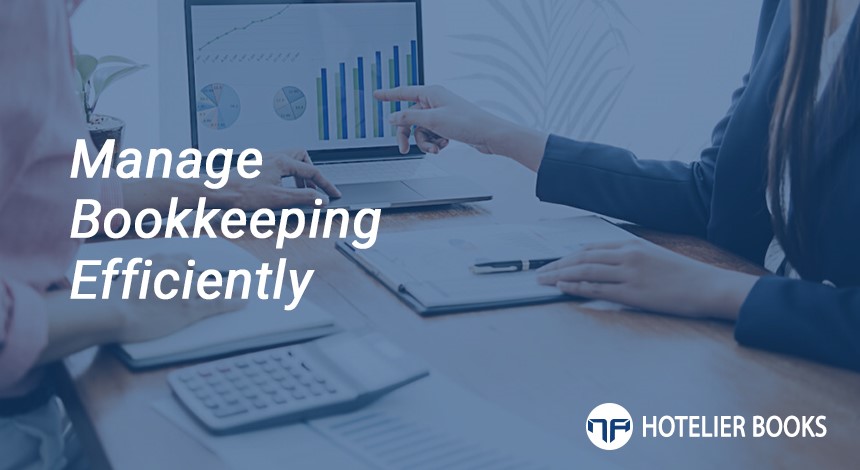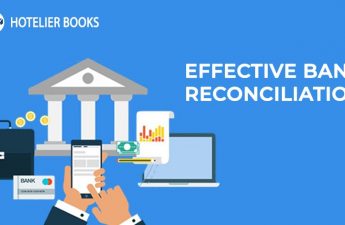We at hotelier books are Certified Bookkeeping Experts and have been analyzing and reporting financial data for over a decade. In the journey we’ve seen things happen to even the best run businesses. Financial issues pop up out-of-the-blue when you least expect them. Some are due to management missteps while others stem from external factors.
In this blog we will highlight 09 bookkeeping mistakes that may lead hoteliers to financial crisis.
1) No Budgeting Process
One of the most important tools in a hotel’s toolbox is a budgeting process. A budget allows you to understand where your business stands financially and where it might go in the future given certain assumptions about revenue and expenses. It also enables you to determine how your business is performing against these assumptions on a monthly and annual basis.
A budget process gives you the necessary information to make good financial decisions, thus allowing you to avoid some of the common bookkeeping mistakes mentioned in this blog. As an example, without adequate cash flow forecasting on your financial statements it would be extremely difficult to justify expansion plans or the purchase of new equipment. At a minimum I recommend that operators of hotels build budgets for both their hotel and their personal finances. This will enable you to monitor revenues and expenses not only at work but also at home . It’s important that you get into the habit of creating detailed monthly forecasts because any one of the following mistakes could derail your best intentions.
2) Poor Receivable Collection
The second most common bookkeeping mistake that leads to financial crisis is late payments or non-payments. The longer receivables stay outstanding the more likely it is that you will have to write them off as uncollectible. The thought of writing off $500, $1,000 or $5,000+ invoices can be extremely painful but it’s better than not having received the money at all!
One way hotels can avoid this problem is by instituting a credit policy. This policy should clearly spell out which customers are eligible for extended terms and how much they are allowed to purchase on credit.
We recommend reviewing your credit policy annually with an eye towards tightening any loopholes that may let customers take advantage of you too much. For example, if you give generous terms to all of your customers but several just stopped paying then it’s time to tighten up the process.
3) Not Allocating Expenses Properly
“Don’t waste resources!” Whenever possible we want our hoteliers using resources most effectively so they get maximum bang for their buck. Here’s where many inexperienced managers go wrong: when they spend money on something, they don’t always allocate it to the right line items in their financial statements.
Let’s use a simple example to illustrate this point. Assume you are an independent hotelier with one hotel that has $500,000 in revenue and expenses of exactly the same amount. Unfortunately due to some poor planning you had to purchase two large pieces of equipment at the same time for $300,000 each. Your balance sheet reflects your situation so it looks like you have $300,000 in net working capital, which is certainly not good news when trying to secure bank financing or investors!
To solve this problem managers must track these types of purchases better by dividing them into two transactions: for the vehicle and another for the equipment itself. Typically we will recommend recording the asset purchase as an operating expense (i.e., “building” or “equipment”) rather than capitalizing it like a new piece of equipment, but that is another discussion! As long as you treat each transaction separately then your financial statements immediately become more accurate and easier to monitor.
4) Not Charging for Food Expenses
When food expenses are provided free of charge it’s very difficult for hoteliers to keep track of their true costs at any given time. Although this may not seem like much of an issue, think about how much money goes into feeding your staff on shift change days! Can you afford the luxury of supplying all their meals gratis? Probably not if you want to pay your bills on time!
Therefore, it’s critical for hoteliers to track all food costs as closely as possible. First, they should establish pricing guidelines that establish the maximum cost of feeding an individual staff member at any given shift (i.e., breakfast, lunch and dinner). Next, they should conduct periodic walkthroughs to check for purchases made in excess of these maximum meal prices. If you find inconsistencies or potential abuses, then it’s time to call a staff meeting and review the situation with all employees. Remember: many hotels have discovered large quantities of food in their trashcans and dumpsters — far more than could ever be consumed in a normal business day!
5) Not Charging Expense Reimbursements Properly
When an employee needs to drive a company car for any period of time it’s best to establish the actual costs and charge them back accordingly. For example, if an office manager needs to use a company car for one month she should receive a monthly reimbursement according to these guidelines: $1,000 per month or $250/week plus auto insurance. At the end of the month her expense report should reflect this simple rule: Car Expense = Monthly Reimbursement – Actual Costs.
If you require your employees to use their own vehicles rather than rental cars then there are several rules we suggest following:
• Charge all mileage expenses on every trip — no exceptions! This includes tolls and parking fees where applicable.
• Establish a per mile rate each year that reflects the average cost of doing business.
• The IRS allows you to use either the standard mileage amount or the actual costs method to determine vehicle expense, but most businesses prefer to take advantage of the former because it is slightly more generous. Keep in mind that if you elect not to use this method then all employees are required to keep track of their trips using a detailed log book!
6) Not Charging for Miscellaneous Expenses
Many hoteliers will include small transactions on credit card statements without realizing they are missing important information. For example, suppose someone buys three pens at $5/each and one pencil at $7 from an office supply store. Although these types of purchases might add up over time, it’s important to charge the appropriate expense account(s) for each item because otherwise it will be difficult to monitor expenses accurately.
The best way to solve this problem is by establishing a petty cash fund that you replenish periodically throughout the year. Next, create an inventory list of all items in your possession (either physical or digital) then prepare monthly statements tracking all purchases made with the petty cash fund. Once you have done this you can adjust your general ledger accordingly and keep track of exactly where your money is going!
7) Not Reporting All Depreciation Expenses
When assets are purchased, depreciation begins immediately so it’s very easy for hoteliers to overlook small transactions down the road. For example, suppose a new dishwasher is purchased behind the kitchen in August and a new roof is installed in December.
Not only should these purchases be reflected on your balance sheet, but they should also be charged against an appropriate expense account! The best way to avoid this dilemma is by instituting a depreciation schedule that outlines how long assets remain in service before needing to be replaced or repaired. Once you have done this you can determine from prior records when each asset was purchased, its original cost and how much of it has been depreciated so far during its useful life. In many cases, hotel owners discover large chunks of their capital tied up in faulty equipment — which could ultimately lead to bankruptcy if not dealt with properly!
8) Not Preparing Year-End Financial Statements
It’s not enough to simply run an end-of-year report and call it a day! You must prepare your financial statements as soon as possible after the end of each fiscal year — preferably within one month at most. If you wait too long to begin this process (or fail to do so altogether) then you expose yourself to risk by allowing accounting errors and omissions to go uncorrected.
Although preparing your statements can be time consuming, there are online solutions that make this task much easier than it sounds. For example, you can use Hotelier Books to track budgets and forecasts, produce reports.
9) Bookkeeping is Not Your Main Priority
Time is money and no business can afford to waste either! Unfortunately, most hoteliers neglect their books for this very reason until long after the end of each fiscal year. Not only does this practice increase your risk of ongoing financial mistakes (such as not recording receivables on time), but it also slows down your ability to make timely payments to creditors and vendors alike. Furthermore, you might even be tempted to outsource some bookkeeping responsibilities which ultimately leads to cash flow problems because more time is spent chasing invoices than actually receiving payment for services rendered in the first place!
The best way to avoid these issues altogether is by using software tools designed specifically for hotel owners. A few examples include online accounting software, online hotel property management software with a point of sale system that boasts integration and a cloud-based reservation system designed specifically for hotels.
In summary, it’s never been easier to manage your books from start to finish…even if you’re a busy business owner who has little to no experience with accounting! All you need is a proper guide and a few hours each week. Just make sure to avoid these common bookkeeping mistakes at all costs because doing otherwise can lead to severe financial consequences down the road!
Hoteliers have a hard time keeping up with all the bookkeeping tasks like reconciling accounts, managing cash flow and staying compliant.
Hotelier books is an online cloud based accounting system that helps you automate your day to day bookkeeping tasks, so you can focus on growing your business.
We are passionate about helping limited service businesses succeed through effective systems and processes that save them time and money. Our suite of cloud-based accounting and bookkeeping solutions allows users to manage their finances from anywhere in the world at any time of the day or night. The intuitive interface in our accounting system and strategic approach in our bookkeeping services makes it easy for anyone to learn quickly and get started right away!




